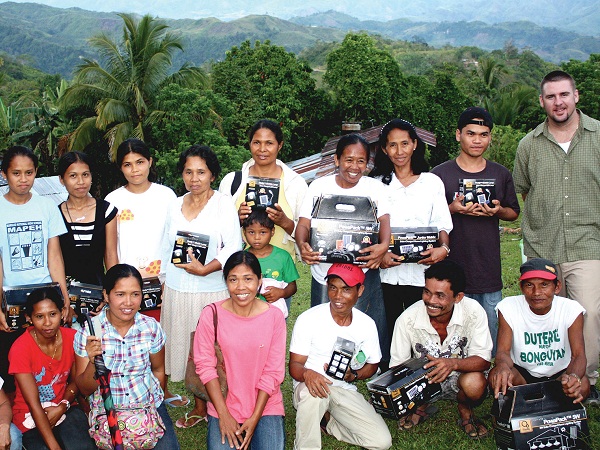Solar-powered rural entrepreneurs

PROUD new owners of solar lanterns pose with John Smith of the Well of Life Foundation. PHOTO COURTESY OF AMORE
Gemma Abag is a typical woman in a rural village. She manages the household, helps her farmer-husband, and takes care of their three young children.
And like every Matigsalog native of Barangay Marilog in the mountains of Davao City, she had accepted the reality that she could not rely on electricity service in going about her domestic duties. Her children struggled to do homework under a flickering gas lamp.
The family finally experienced the convenience of light in April when the Alliance for Mindanao and Multi-Regional Renewable/Rural Energy (Amore) Development Program brought solar home systems and solar lanterns to the village.
Amore is a rural electrification scheme sponsored by the US Agency for International Development, in collaboration with the Department of Energy. Implemented by the US-based nonprofit group Winrock International, it has brought an alternative energy source to off-grid communities, mostly in Mindanao, using renewable energy technologies such as solar and micro-hydroelectric.
Like a beacon
For Gemma, light coming from solar photovoltaic (PV) sources was like a beacon, guiding her along a path never before taken by a Matigsalog woman—that of a solar entrepreneur. Her journey began even before the technology was introduced to the residents.
In October last year, the Well of Life, a Davao-based nongovernment organization helping people pursue organic farming and livelihood projects, sought out Amore and suggested a household electrification project in Marilog. Solar home systems had just been installed in two neighboring villages the previous year.
Amore was then rolling out a new scheme called the Business Development Assistance (BDA), which would help facilitate the commercial sale and sustainable operations of PV systems in the underserved rural market. The package taps financing and delivery mechanisms that are affordable to households.
The Well of Life revived a women’s association, of which Gemma is a member, which was formed many years back by a village councilor, and renamed it the Marilog Solar Women Association (MSWA).
Empowering women
It was in recognition of women’s natural nurturing predisposition, as well as their capacity for long-term care and maintenance of renewable energy systems, that Amore responded to the Well of Life proposal. Early this year, Amore held week-long training sessions on PV operation, maintenance and troubleshooting in the cities of Pagadian, Dipolog, Zamboanga and Cotabato, which drew a total of 65 women from project sites across Mindanao.
While their husbands look for jobs in the fields and big cities, the women stay in the community. As they are the first to be concerned when basic necessities run out in their households, the women will certainly not allow a most enjoyed convenience such as light to be snatched away from them because of poor maintenance.
It took three months to prepare the women for the new undertaking. They learned the skills of a technician and an entrepreneur. They were after all serving as custodians of 88 solar lanterns and two solar PV battery charging stations, and managing to extend the benefits of light to many more households in the village.
The MSWA, which has 150 members, has proven to be very capable.
Fee collections
A few weeks into the project implementation, the members were able to collect P3,900 in participation fees and extra night fees from consumers under a lease-to-own scheme. The amount included P10 that solar lantern lessees pay each time they recharged the equipment at the station.
The association will add small solar chargers with internal rechargeable batteries ideal for charging cell phones and PDAs, and power up small LED lights for task lighting to their line of solar PV products.
As part of Amore’s continuing support to budding solar entrepreneurs, it will give the MSWA 16 units of small solar chargers as incentive to clients buying PV products in cash or those operating a cell phone-charging business.
The tariff, P5 per night for solar lantern rental, that the MSWA collects is largely based on the amount the residents spend for kerosene. Households spend P150 to P300, excluding transportation costs, monthly for kerosene.
Business expansion
Under the lease-to-own scheme, the residents can own the lantern after 25 months of paying for as low as P150 a month. Because of its affordability, it is no wonder that many households are interested in leasing solar lanterns.
So far, the women’s organization has not even reached a tenth of the market. Only 88 solar lanterns are being leased in a village of more than 2,600 families.
The women’s association hopes to solve the situation by partnering with the Center for Agriculture and Rural Development, a microfinance institution, in expanding the business and possibly getting more solar PV equipment.
This way, the benefits of light may reach the rest of the community, and no mother shall have to watch her children choke on kerosene lamp smoke again.
The author is a former information, education and communications coordinator of Amore.














